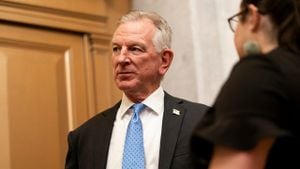Climate change discussions are heating up, and as world leaders convened for COP29 in Baku, Azerbaijan, they were met with alarming new data painted vividly by the Climate Action Tracker. This report revealed the stark reality of greenhouse gas emissions and illustrated how the world is veering dangerously off track from limiting global warming. Despite various countries' pledges to cap temperature increases, the track records show substantial gaps between commitment and action.
According to the report released during the UN climate summit, if current policies persist, the planet is on course to warm by approximately 2.7 degrees Celsius (4.9 degrees Fahrenheit) by the year 2100. This unsettling forecast mirrors the previous three years, with hardly any improvement noted. "We are clearly failing to bend the curve," noted Sofia Gonzales-Zuñiga, who contributed to the report. She emphasized the urgency of adapting contemporary strategies to tackle the ever-accelerated climate crisis.
Despite ambitious targets set out in the Paris Agreement, where countries pledged to keep global temperature rises well below 2 degrees Celsius—preferably even lower—the diminishing likelihood of reaching these targets has been underscored. Every fraction of degree of warming carries heightened risks such as extreme heat waves, intense wildfires, prolonged droughts, destructive storms, and the unsettling prospect of species extinction.
The imperative of recalibrated goals was demonstrated by the mixed progress on initiatives aimed at curtailing carbon emissions. The numbers don’t lie: many nations, including the U.S., have legislated ambitious climate bills like the Inflation Reduction Act, which is projected to inject massive investments—billions of dollars—into renewable energy sectors. Concurrently, electric vehicle sales have surged to record levels, particularly notable within countries like China. Yet, contrasting this progress is the undeniable reality of rising energy demands. With fossil fuel reliance still rampant, especially as economies strive for recovery, the clean energy transition feels sluggish.
Underlying these discussions is the financial pulse of the planet’s energy systems. It’s hard to ignore the rising contradiction: global banks, under the net-zero label, are funneling vast resources toward fossil fuel giants, enabling their expansionist endeavors. An investigation by The Bureau of Investigative Journalism revealed these ‘net-zero’ banks collectively raised over $1 trillion to back fossil fuel projects since mid-2021—an alarming number when considering these projects could emit approximately seven times the annual greenhouse gasses emitted by the United States.
For example, BP has boldly pursued initiatives like the Shafag-Asiman gas field project off Azerbaijan’s coast. This endeavor alone could release over 1 billion metric tons of carbon, presenting a massive setback to global climate objectives. A plethora of high-profile banks including JPMorgan Chase, Citigroup, and Wells Fargo have helped facilitate BP's attempts to amass funds—raising around $5 billion last year to support the fossil fuel industry.
Such actions have led to sharp criticism and anxiety among climate advocates. John Lang, the head of the Net Zero Tracker, is vocal about the dilemma posed by banks. He remarked, "It’s indefensible. There’s no way we can meet the temperature goals of the Paris Agreement if we continue financing the exploration of oil and gas. It’s greenwashing, plain and simple." This sentiment is echoed by various climate policymakers who maintain the core issue lies within the regulatory framework—or the lack thereof. The current structure is failing to hold entities accountable, allowing fossil fuel companies to exploit loopholes freely.
The backdrop of these revelations at COP29 is particularly poignant. Global discussions are focusing not only on emission cuts but also on how to channel the estimated trillions necessary for mitigating climate impacts, particularly for developing nations bearing the brunt of climate disasters. Future dialogues must hold corporations and financial institutions to the pledge of not just reducing emissions, but also refraining from facilitating the very expansion of fossil fuel projects they claim to be countering.
Even amid the disarray, some positives can be recognized. Countries have been ramping up renewable energy generation targets. The European Union has laid plans for advanced heat pump installations to leverage clean energy. Yet, the timeframe is disconcerting, for many countries are simply not progressing fast enough to meet their stated commitments.
At COP29, leaders must grapple with the message conveyed by scientists urging immediate action to adhere to the lofty promises laid out by the initial Paris Agreement. Current trends suggest scuttling those goals, painting the climate pact's successes as fleeting illusions. Glen Peters, from CICERO Center for International Climate Research, argued from his research findings, declaring, "It is always possible to find arguments to make 1.5°C forever possible, but they increasingly diverge from reality. It is time to admit the world will cross 1.5°C."
Though achieving net-zero emissions seems like climbing Everest, it’s imperative for humanity to press on, punctuated by Peters’ observation, "Crossing 1.5°C is not time to give up; it is time to acknowledge failures and rally to find new hopes moving forward." The necessity for tangible actions, comprehensive accountability, and sustained investments toward genuinely clean energy solutions remains the pathway as Baku wraps up its climate talks.
Leaders, negotiators, and societies worldwide face staunch decisions post-COP29. Will they rise above the current traps of greenwashing and happenstance politics? Will they commit to concrete policies and eliminate fossil fuels from their financial backbones? With the climate clock ticking, it becomes increasingly clear: more than words are needed to pave the way forward. The stakes are undeniably high, and the world is watching, waiting for leaders to not just dream but to galvanize action toward our collective future.



